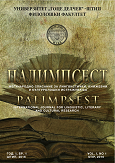GESCHICHTLICHE ENTWICKLUNG DES PASSIVS IM DEUTSCHEN UND ALBANISCHEN
DEVELOPMENT OF THE PASSIVE VOICE IN GERMAN AND ALBANIAN
Author(s): Ergys PriftiSubject(s): Language and Literature Studies, Theoretical Linguistics, Semantics, Comparative Linguistics
Published by: Универзитет »Гоце Делчев« - Штип
Keywords: passive voice; development; historical; verbs; tense; passive sentences; transformation.
Summary/Abstract: This article presents various aspects of the historical development of the passive voice in German and Albanian. The passive voice is a grammatical category, which is an important part of grammar in both languages. The passive voice helps the speaker to express himself skillfully or confidential. In order to better understand today's passive structures, it is helpful to gain insight into the historical development of such structures. In German, this representation begins since Gothic and then with Old High German and Middle High German. In Albanian, on the other hand, we can only rely on the book of Buzuku (1555), which constitutes the first written official document of written Albanian. Corresponding examples illustrate the stages of development of the passive voice in both languages. They have been translated into today's German or Albanian to make it easier for the reader to understand the content. The summary for each stage of development of the languages is given at the end of each presentation.
Journal: Палимпсест, Меѓународно списание за лингвистички, книжевни и културолошки истражувања
- Issue Year: 8/2023
- Issue No: 15
- Page Range: 75-83
- Page Count: 9
- Language: German

